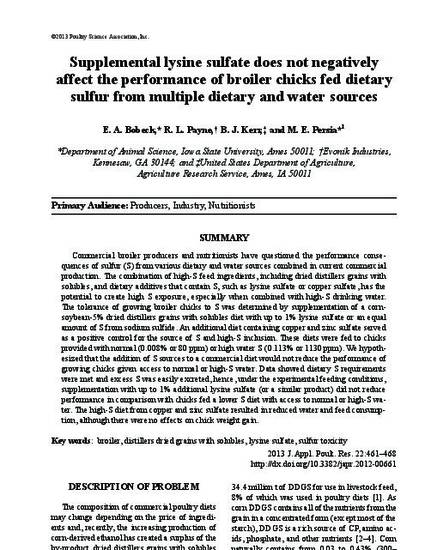
Commercial broiler producers and nutritionists have questioned the performance consequences of sulfur (S) from various dietary and water sources combined in current commercial production. The combination of high-S feed ingredients, including dried distillers grains with solubles, and dietary additives that contain S, such as lysine sulfate or copper sulfate, has the potential to create high S exposure, especially when combined with high-S drinking water. The tolerance of growing broiler chicks to S was determined by supplementation of a corn-soybean-5% dried distillers grains with solubles diet with up to 1% lysine sulfate or an equal amount of S from sodium sulfide. An additional diet containing copper and zinc sulfate served as a positive control for the source of S and high-S inclusion. These diets were fed to chicks provided with normal (0.008% or 80 ppm) or high water S (0.113% or 1130 ppm). We hypothesized that the addition of S sources to a commercial diet would not reduce the performance of growing chicks given access to normal or high-S water. Data showed dietary S requirements were met and excess S was easily excreted, hence, under the experimental feeding conditions, supplementation with up to 1% additional lysine sulfate (or a similar product) did not reduce performance in comparison with chicks fed a lower S diet with access to normal or high-S water. The high-S diet from copper and zinc sulfate resulted in reduced water and feed consumption, although there were no effects on chick weight gain.
Available at: http://works.bepress.com/elizabeth-bobeck/7/

This article is published as Bobeck, E. A., R. L. Payne, B. J. Kerr, and M. E. Persia. "Supplemental lysine sulfate does not negatively affect the performance of broiler chicks fed dietary sulfur from multiple dietary and water sources." Journal of Applied Poultry Research 22, no. 3 (2013): 461-468. doi: 10.3382/japr.2012-00661.